Behind the scenes of the recording of Sally Beamish’s Seafarer Trio
Amanda Holloway
Friday, December 19, 2014
Amanda Holloway visits Trio Apaches and Willard White at St George’s Bristol as they record Beamish's new work
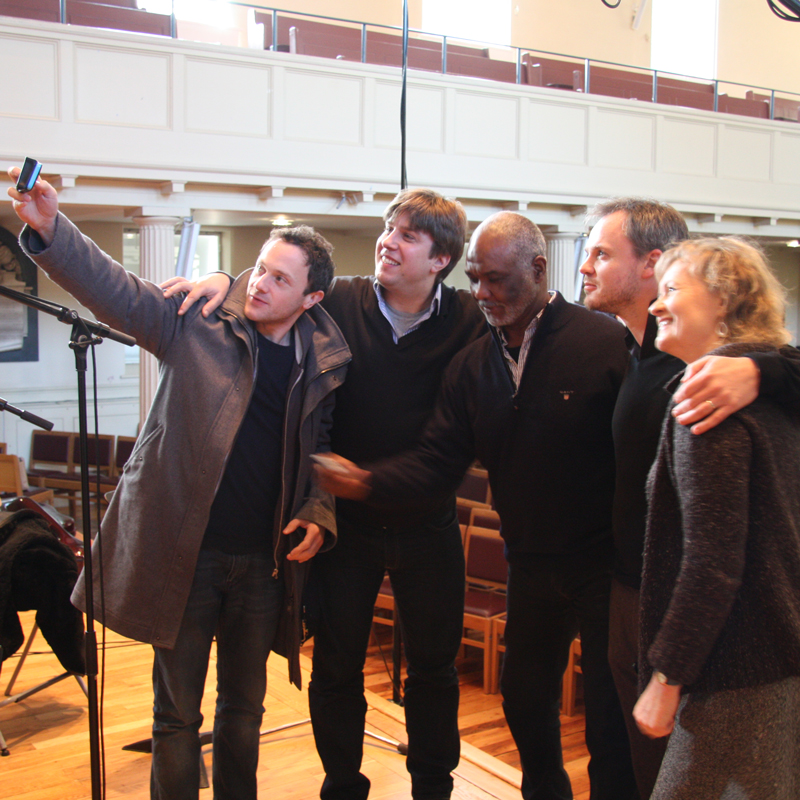
On a bleak January day, a legendary figure from England’s past is being brought alive in a deserted church by four musicians, a composer and a record producer. The poem of the Seafarer, charting the journey of an Everyman adrift on a pitiless ocean, seeking salvation, was found in a 10th-century codex at Exeter Cathedral. Composer Sally Beamish was inspired to write three Seafarer-based works, including this one for piano trio and voice which is being recorded for Orchid Classics by the young ensemble Trio Apaches.
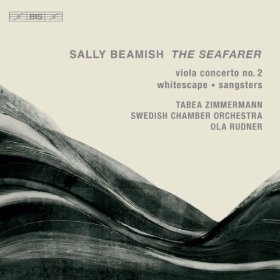
The narrator today is no hoarse-voiced mariner, though, but the celebrated bass-baritone Sir Willard White, whose vigorous, velvety tones caress and animate the poetry, bringing it off the page like an operatic performance. As he says later, ‘I have only one voice: sometimes it speaks and sometimes it sings. I’m exploring another aspect of myself and these guys have helped me.’
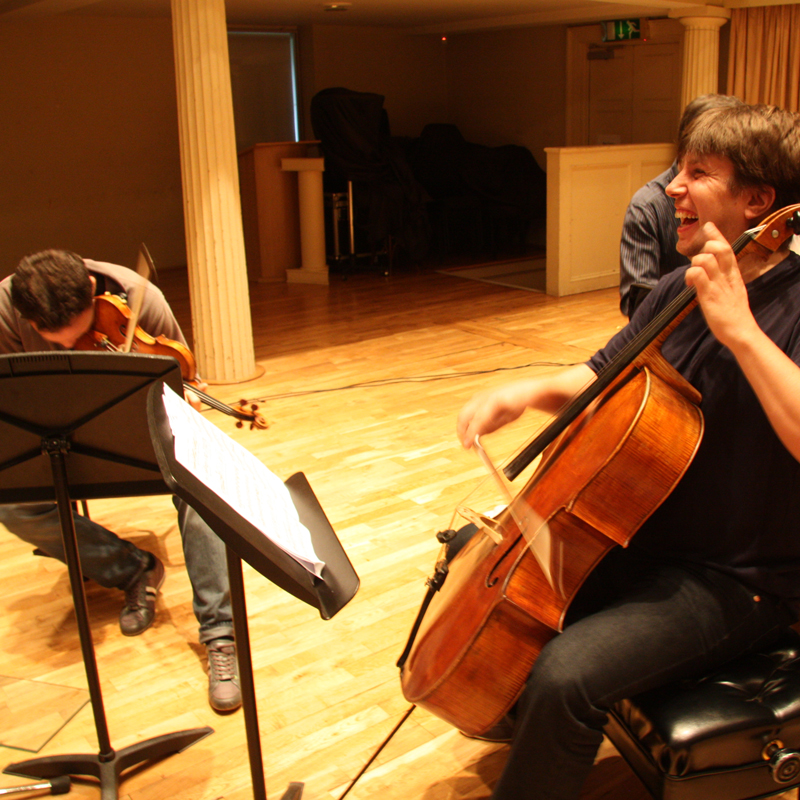
‘These guys’ are Matthew Trusler (violin), Thomas Carroll (cello) and Ashley Wass (piano) – outstanding soloists who play together as Trio Apaches (loosely, The Hooligans, in French!). Wass says they fell in love with The Seafarer when they programmed it for the Lincolnshire International Chamber Music Festival in 2012: ‘First we were struck by the quality of the musical score, which was fresh, innovative, dynamic, communicative.’ But when the narrator joined them, ‘the poem added flesh to our musical bones’. It was, quite simply, says Wass, ‘achingly beautiful’. Parts 1 and 2 were recorded yesterday in St George’s Church, Bristol, and today they’re recording the third and final movement.
As I slip into a front-row pew, Carroll and Wass are creating the sound of a lonely bird bobbing on the waves. Then Willard White intones dramatically: ‘The gowk repeats his plaintive geck, foreboding bitterness of breast.’ It’s thrilling to be the sole audience member, hearing this magnificent voice and watching the expansive hand gestures and the noble frown.
On this winter morning the church resembles the Seafarer’s ship not only in its bare, creaking wooden floors but in its lack of heating. The musicians struggle to keep their fingers warm enough to negotiate the solos, the sudden swells of sound and tricky rhythmic corners. Trusler manages to nail a fiendishly difficult solo passage with lots of harmonics and double-stopping, rubbing his fingers and shadow-boxing between takes. The cello has a melancholy, singing line like the whale’s song, while the violin is the wheeling and calling of tern, gull and curlew.
The control room is in a windowless cellar, where Beamish and producer Michael Ponder sit facing a wall and two speakers, communicating with the performers by a small PA system. Beamish is encouraging; she points out, gently but firmly, things in the score that she would like them to observe, but lets other things go. Trusler says it’s good to have the composer there and to hear her feedback.
Trained as a viola player, Beamish moved to Scotland in the 1990s, and her compositions – not least The Seafarer – have picked up some of the cadences and atmosphere of her adopted homeland. She was a featured composer at the Proms this summer with a performance of her accordion concerto The Singing, which commemorated the Highland Clearances. She has worked with poet Sir Andrew Motion on Equal Voices, a joint commission from the London Symphony Orchestra and Royal Scottish National Orchestra to mark the start of the First World War, which was be premiered at the Barbican on November 2.
Midway through the morning the musicians crowd into the control room while Ponder plays back the results; each is listening for their own performance. ‘That was a good one for me,’ says Trusler, while Carroll says, ‘I felt I could get a bit more swing there… could we do it again?’ Though White’s voice and personality dominate on stage, when you hear the recording, the Trio has managed to create a symphony of textures and colours that allow the text to emerge organically from the score.
Ponder says having a narrator adds another challenge to the recording: ‘Each version changes from take to take, so you have to get round that.’ He has had years of experience in balancing the contribution of different instruments. ‘There will always be someone who isn’t playing as well on one take, but I try and find a good compromise. Today you can easily cut between things.’
Listening to the barely 30-minute piece, it’s impossible to be unaffected by this elemental journey. Even Sally Beamish was unexpectedly moved. ‘I try to go to all the recordings of my pieces, but this one has been very special,’ she says. ‘I was overwhelmed when I first heard Willard speaking the words, and I found myself in tears at the end.
‘The themes of the text go very deep: the sea journey is a journey of life. The poem begins, ‘This is the Truth’, and that has certainly led to some profound conversations between us all over the last two days.’
As the afternoon draws on and the Seafarer approaches the end of his journey, some divine presence makes itself known. White’s dark bass voice intones the words, ‘Heaven, haven of our Lord’s love’, and a ray of sunlight floods the stage.
The Seafarer is home; the session is over, and all that remains is the editing process.
The Seafarer is paired with Sally Beamish’s arrangement of the most famous sea piece of all, Debussy’s La mer, out now. Read the Gramophone review of this recording.
Recommended Beamish recordings
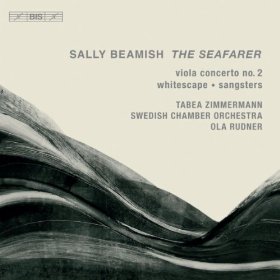
Viola Concerto No 2, ‘The Seafarer’
Tabea Zimmermann va Swedish Chamber Orchestra / Ola Rudner
(BIS)
This was the first of three works to be inspired by the Seafarer poem. Beamish’s clear, confident painterly composition captures the stark conditions of the North Sea. Here the viola is the Seafarer, sailing through life’s choppy waters accompanied by birds and wind. It’s fascinating to compare the way the story is told through Tabea Zimmermann’s expressive viola, rather than the version with voice, and a bigger orchestra provides the seascapes. Read the Gramophone review
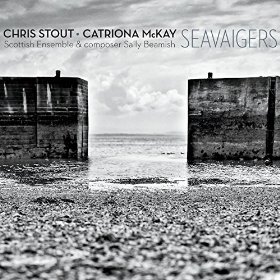
Seavaigers
Chris Stout vn Catriona McKay hp Scottish Ensemble
(McKay Stout Music)
Beamish’s concerto for Scottish fiddle and harp, Seavaigers, was premiered in Glasgow, at Celtic Connections 2012. You can hear that mournful, keening birdsong again, but with a different set of instruments and different melodies. At first the harp and fiddle stand out above a wash of string sounds, then everything bursts into a wild, joyful dance spiked with Scottish rhythms.
Recommended Trio Apaches recordings
(This is their first recording as a trio, but individually each artist has recordings on Orchid Classics)
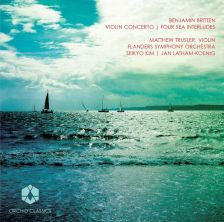
Britten Violin Concerto
Matthew Trusler vn Flanders Symphony Orchestra / Seikyo Kim
Orchid Classics Full price ORC100037
A beautifully articulated, unfussy and intelligent performance of Britten’s great Violin Concerto that goes straight to the heart but satisfies the mind as well. Read Gramophone review
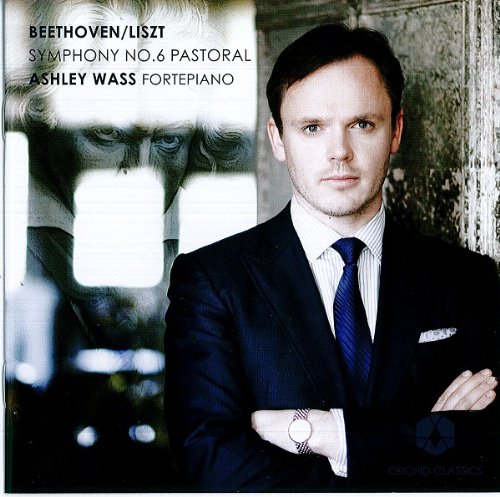
Beethoven Pastoral Symphony (transcr Liszt)
Ashley Wass fp
(Orchid Classics)
It takes a little getting used to: this familiar work played on something that sounds like your school piano. But once you’re in the groove, Wass’s winning interpretation, less frilly than Liszt, less pastoral than Beethoven, is worth hearing again and again.

‘Vienna’
Thomas Carroll vc Llŷr Williams pf
(Orchid Classics)
A luxury pairing: two young musicians with formidable technical skill and a modern sensibility give these lush Romantic sonatas by Brahms and Schubert an interesting edge. The Beethoven ripples and sings under the fingers of Llŷr Williams, while Carroll hints at a darkness under the peaceful surface.











